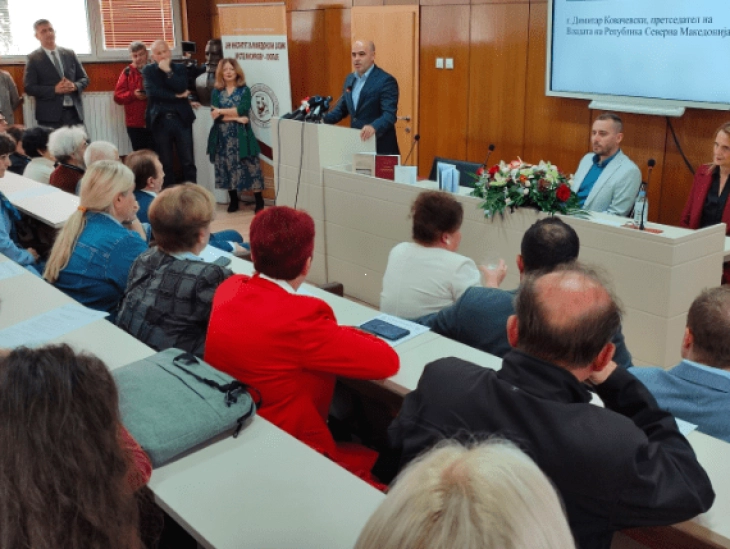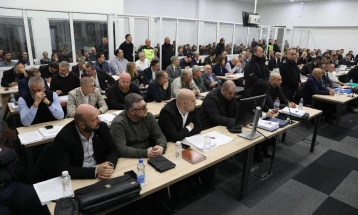Kovachevski: Frontex agreement – a clear recognition of the Macedonian language

Skopje, 17 October 2022 (MIA) – If our children leave, there will be no one left to speak the language of our ancestors, said Prime Minister Dimitar Kovachevski in his address at the beginning of the 7th Open Days organized by Krste Misirkov Macedonian Language Institute from Monday through Friday.
The future generations should remain in the country and that is why the concept and the obligation of this Government, said the Prime Minister, is for the country to become an EU member until 2030, so they can have a future here. The only challenge to our language, said Kovachevski, does not come from the east, west, south or anywhere else, but from here and from us, the language does not live only in literature, it must also be spoken by the people.
“Our language is our fatherland – this is what Blazhe Koneski left us, his legacy is a foundation of the Macedonian language, and with that a foundation of the Macedonian identity and national culture. But Koneski also pointed out that it is up to us whether our linguistic environment is threatened or not. And this is not less important. On the contrary, it is a motive and obligation for all who deem themselves an extension of his work,” said Kovachevski.
The negotiations with Bulgaria, France and other EU member states, in order to secure the beginning of the accession talks, were difficult, he said, as a participant in the negotiations and amid all attacks both from outside and inside the country, Kovachevski said, he shared the same difficult feelings as the other Macedonian citizens: “as if someone is cutting up your gut with a knife.”
“But in the end, someone had to make a decision. That decision is for the future of this generation and the future of the generations yet to come – whether we will choose a concept which will keep our heads raised, as Macedonians, with a protected Macedonian language, in order to begin our EU accession talks and be a part of the discussions in Brussels… Or the other concept, which is a concept of fake pride, isolated, alone, with impoverished citizens, with bad relations with the neighboring countries and the EU. Our citizens do not want that,” said Kovachevski.
Apart from in the United Nations, the Macedonian language is now also official in the EU, underscored the Prime Minister adding that the decision to sign the Agreement on Border Management (Frontex) between the European Union and North Macedonia adopted by the EU Council a few days ago represents a clear recognition of the language.
“There are no additions, no footnotes. This is the first agreement signed between Macedonia and the European Union which contains a clear Macedonian language. There are no more specific, careful formulations like: Blazhe Koneski’s or Mateja Matevski’s language, but a clear Macedonian language. In the official statements of all European leaders, of all representatives of the international community, the term Macedonian language is now clearly and explicitly used,” said Kovachevski, pointing out that the entire EU legislation will be translate into Macedonian and that Macedonian is equal to all the other languages of the EU.
At the signing of the Frontex Agreement, which will happen in a few weeks, he said, he will not be accompanied by politicians or cabinet officials, but by the professors of Macedonian studies, Ljudmil Spasov – president of the Macedonian Language Council, and Elena Jovanova-Grujovska, director of the “Krste Misirkov” Macedonian Language Institute.
At the opening of the 7th Open Days, it was announced that the Institute, which in 24 years has had only one new employee, will receive 17 new employees in 2023. Thirteen of them have been realized, while four more will be realized by the end of October. Kovachevski announced that he immediately advocated for new employees after he heard of the Institute’s needs and underlined that those accusing him of false patriotism, for 11 years did nothing for the Institute’s employment needs.
The PM further pointed out that with the support of the Government, the digitization of all of the Institute's files is nearing completion, and this will make the Macedonian language available anywhere in the world and protected for future generations. ad/sk/







